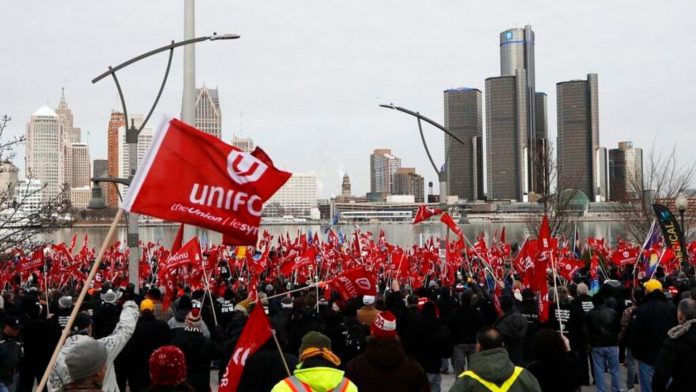In the evening of October 10th, just hours after 4,300 workers at three General Motors facilities in Canada went on strike, the Canadian union Unifor and GM tentatively reached an agreement.
According to the association, the three-year GM deal, similar to the agreement with Ford, will include shorter processes for workers to achieve higher pay, reactivation of a cost-of-living allowance to combat inflation, and hourly wage increases of up to 25%.
The Canadian union stated that the “strike actions are on hold to allow the membership to vote on the tentative agreement.” However, for the agreement to be ratified, most employees must vote in favor of it.
When the parties could not agree by the deadline of October 9 at 11:59 p.m., Unifor declared a nationwide walkout. A stamping plant, a parts distribution center, a manufacturing site for certain V6 and V8 engines utilized in a range of cars, including the Chevrolet Equinox and GM’s full-size SUVs, and an assembly plant that makes light- and heavy-duty Chevrolet Silverado trucks were all briefly impacted by the strike.
Lana Payne, the president of Unifor, now anticipates moving onto negotiations with Stellantis, which has the most significant footprint of the Detroit automakers in Ontario, Canada.
Unifor, representing 18,000 Canadian workers at the Detroit automakers, adopted a more traditional negotiation approach than its U.S. equivalent. The Canadian union is negotiating with each automaker independently and using a contract first made last month with Ford as a “pattern” for GM and Stellantis.
Since the work stoppages started, the UAW has gradually increased its strikes due to the parties’ failure to achieve tentative agreements by September 14.
Only 25,200 employees, or around 17% of UAW members with active contracts with Detroit automakers, are currently on strike. According to prior statements by UAW President Shawn Fain, the union will increase work walkouts depending on the progress of the negotiations.
However, thousands of other UAW members have lost their jobs due to the strikes, including roughly 2,175 workers at other GM facilities. Most notably, the Detroit automaker was forced to idle production of a Kansa assembly plant that produces Chevrolet Malibu sedans and Cadillac XT4 crossovers.





